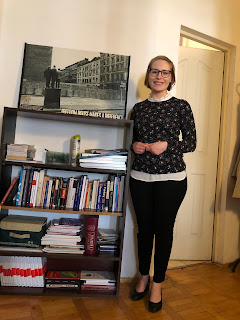Research in Romania: The Importance of Validity
 |
| Visit to Freedom House |
Over Spring Break, I traveled to Romania to research the strength of civil society and democratic breakdown for my Substantial Research Project. On an SIS Travel Grant, I was able to conduct over twelve interviews with members of NGO’s, expert academics, and activists working in the political sphere. My research originally centered on a strong and robust civil society in a country experiencing democratic backsliding. However, from my in country experience, I learned that civil society is not very strong and through my various interviews I able to find a working theory for my research on why democracy is declining in Romania.
Every year since 2012, Romanians have participated in country wide protests against government corruption and proposed legislation that would compromise the independence of the judiciary system. The protests were so large and loosely organized that it lacked a hierarchy of leadership for negotiations. This resulted in the government giving in to the demands of protesters. In 2012, Romanians took to the streets to protest the government’s legislation to privatize emergency services. In 2013, major demonstrations took place after the government passed legislation that would allow a mining company to expropriate the homes of citizens in Rosia Montana for a mining project that would use 12,000 tonnes of cyanide yearly to mine gold, causing major environmental damage. Protests again erupted after a major fire in a club killed 64 people, eventually leading to the resignation of the Prime Minister. Demonstrations continued in to 2017, when protesters’ demands were met causing the government to rescind a law that would decriminalize graft under $50,000.
 |
| Prototype for the infamous #rezist tag for the 2017 protests |
My preliminary research into this topic gave me the impression that civil society was not only incredibly active but strong enough to pressure the government into anticorruption reforms and preventing democratic backsliding. However, the opportunity to travel to Romania where I could speak with those working day to day in the trenches gave me insight into the complicated nature of civil society, competing interests, lack of funding, and legislation being passed to undermine the efforts of democratic activists. My time in Romania was pivotal in understanding what is causing democratic break down in Romania and other post-communist states in Europe. The interviews I conducted, led me to formulate a theory that the EU may be stabilizing illiberal regimes through the provision of structural funds and unintentionally contributing to democratic breakdown, fundamentally undermining the European Union’s goals of democracy building in the East.
 |
| Freedom House interview with a very important expert, Fritz the Cat. |
The SIS Travel Grant provided me with the experience to conduct field research for the first time. My week in Romania was formative for me as a researcher and has been instrumental in filling in the gaps of my research into democratic erosion. Without in country research, I might have made some incorrect assumptions that would have compromised the validity of my research. Furthermore, the SIS travel grant gave me the chance to network and make contacts for future research in my PhD. Having research experience of this caliber as a Master’s student will set me up for success in my doctoral work.


Comments
Post a Comment